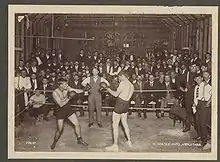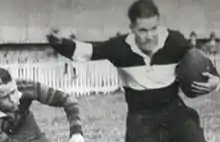Jimmy Sharman
James Sharman (20 June 1887 – 18 November 1965) was an Australian boxing troupe and entertainment impresario. His son also worked with him and took over for his father in 1955 after playing as a professional rugby league footballer.
Jimmy Sharman | |
|---|---|
 Jimmy Sharman Sr refereeing a boxing match between Prest and Lewis in the 1910s | |
| Born | 20 June 1887 Narellan, New South Wales, Australian |
| Died | 18 November 1965 (aged 78) Camden, New South Wales, Australia |
| Occupations |
|
Biography
Sharman was born in Narellan, New South Wales, the fifth of thirteen children to James Sharman and Caroline Brailsfield, he established a boxing tent in 1911 at Ardlethan near Temora.[1] The tent visited 45 to 50 shows each year.[2] His son, Jimmy Sharman Jr, took over the business in 1955. The tent formed part of the Australian Show landscape until 1971, when regulations barred boxers fighting more than once a week. A member of the "Showmans Guild of Australasia", he then turned to dodgem cars in partnership with Garry oneill Reg Grundy.[3]
Jimmy Sharman jr.
Jimmy Sharman Jr. | |
|---|---|
 Jimmy Sharman playing for Wests | |
| Born | James Michael Sharman 1912 Narrandera, New South Wales, Australia |
| Died | 26 April 2004 (aged 94) |
| Occupations |
|
Sharman junior was born, as James Michael Sharman in 1912 at Narrandera, New South Wales. He attended his first Sydney Royal Easter Show in 1926 working in his father's tent.[4] Sharman junior played rugby league for Western Suburbs Magpies.[5] He was fullback in Western Suburbs' 1934 premiership win against the Eastern Suburbs. In 1938 he became First Grade captain. He retired after 7 seasons in 1939 to become a journalist, taking over the boxing tent from his father in 1955.[6] Sharman played 45 games between 1935 and 1939, scored 12 tries and kicked 11 goals. He died on 26 April 2006, aged 94.[7] He was awarded life membership in 1998.[8]
Jimmy Sharman's Boxing Tent
Many famous boxers worked in the Sharman tent, including:
- Ronald O'Callaghan
The Black Irish Man (champion) Aboriginal
- Frank Burns (middleweight champion)[2]
- Graham Burns, Jeff Burns, Ted Burns, Charlie Burns[2]
- Teddy Green (bantamweight)[2]
- Harry Mack (featherweight)[2]
- Mickey Miller (bantam and featherweight)[2]
- George Cook (heavyweight)[2]
- Jack Hassen (lightweight)[2]
- Billy Grime (triple titleholder)[2]
- Jackie Green (triple titleholder)[2]
- Dave Sands Aboriginal boxer[9]
- Greg McNamara (light-heavyweight)
Famous Indigenous Australians to work in the tent include:
- George Bracken, Aboriginal lawyer[8]
- Geoff Clark, former ATSIC chairperson[8]
- Douglas Nicholls, later Pastor with the Churches of Christ in Australia and then Governor of South Australia[8]
- Max Stuart, convicted murderer and Arrente elder[10]
Some boxers came from the Cherbourg Aboriginal mission, near Nanango, Queensland.[3]
Legacy
In 2003 the Royal Agricultural Society of New South Wales honoured Sharman Jr. with the title of "Show Legend".[4]
In popular culture
- The Australian rock band Midnight Oil's 1984 album Red Sails in the Sunset includes the song "Jimmy Sharman's Boxers" whose lyrics assert that Sharman exploited the Aboriginal boxers he employed in his show.[11]
- The Australian rock band Cold Chisel's song "Yesterdays" has lyrics which refer to Jimmy Sharman's boxers .
- The 2007 Peter Carstairs film September features its main characters - 15-year-old boys Ed and Paddy - setting up a boxing ring on Ed's family's wheatbelt property in anticipation of a visit by Sharman's boxing troupe. Paddy later joins the troupe.
- Jimmy Sharman Jr's son Jim Sharman became a theatre and film director known especially for the musicals Hair, Jesus Christ Superstar, The Rocky Horror Show, and the movie version, The Rocky Horror Picture Show.
- One Paul Kelly track, "Rally Around the Drum", written with Archie Roach, was about an Indigenous tent boxing man.
- Colleen McCullough's novel, The Thorn Birds, features a character joining Jimmy Sharman's troupe.[12]
Stephen McGraths historical fiction novel Jimmy Sharmans Boxers published 1 September 2023 describes Sharman’s touring during World War One when Sharman who was 27 and fit did not enlist and continued to tour his troupe throughout the war.
References
- "The Sharman Boxing Troupe". Our History. Temora Shire Council. 2004. Archived from the original on 20 August 2006. Retrieved 11 June 2006.
- Corris, Peter; Diane Langmore (1988). Sharman, James (1887 - 1965). Australian Dictionary of Biography. Retrieved 10 June 2006.
- Lewis, Daniel (15 April 2003). "Sharman the showman is an official bloody legend". The Sydney Morning Herald. Retrieved 10 June 2006.
- "Show Memories: The 2003 Easter Show". Royal Agricultural Society of New South Wales. 2005. Archived from the original on 19 August 2006. Retrieved 10 June 2006.
- Toby Creswell and Samantha Trenoweth (2006). 1001 Australians You Should Know. Australia: Pluto Press. p. 710. ISBN 978-1-86403-361-8.
- "magpie history". Western Suburbs District Rugby League Football Club Ltd. 2005. Archived from the original (Google cached version - not available on the Internet Archive) on 21 August 2006. Retrieved 10 June 2006.
- Masters, Roy (2001). "It's long enough, it's high enough ... but the game's just not the same". RL1908 Document archive. RL1908.com reproducing article originally published in the Sydney Morning Herald. Archived from the original on 29 September 2007. Retrieved 10 June 2006.
- Graeme, Leech (27 April 2006). "Master of the troupe". Features. The Australian. Retrieved 10 June 2006.
- Sloane, Garry (3 October 2003). "Journal of a Journey". November 2003 archives. ochre-shores.net. Retrieved 11 June 2006.
- Thornton, Henry (2002). "Black and White:The story of a famous legal case". henrythornton.com. Archived from the original on 11 September 2006. Retrieved 11 June 2006.
- "Final bell for showman Jimmy Sharman". Melbourne: The Age. 26 April 2006. Retrieved 10 June 2006.
- McCullough, Colleen (1977). The Thorn Birds. ISBN 9781781852514. Retrieved 22 June 2018.
External links
- Pictures:
- Carter, Jeff (1959). "Jimmy Sharman's travelling stadium, New South Wales, 1959" (picture). PictureAustralia. National Library of Australia. Retrieved 11 June 2006.
- ADB biography